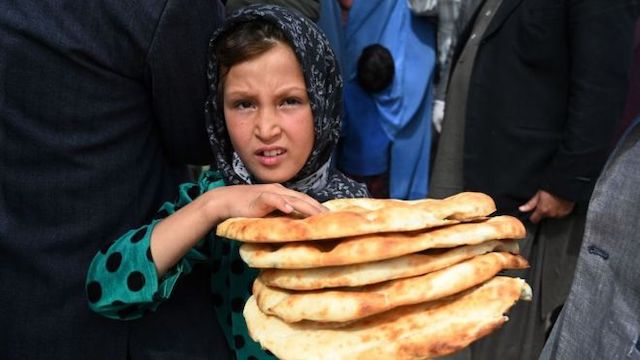More than seven million children in Afghanistan are at risk of hunger as food prices soar due to the lockdown following the spread of coronavirus-COVID-19--in the country, Save the Children said in a report on Friday.

At a time when Afghan children need adequate daily nutrition to help strengthen their immune systems to fight the impact of the coronavirus pandemic, the price of basic foods is rising under the lockdown, making it harder for families to feed themselves, the report said.
The organization also warned that a third of the country will face food shortages.
A third of the population - including 7.3 million children - will face food shortages in April and May due to the current pandemic, the organization said.
According to the aid organization, even before the global COVID-19 crisis, the total number of children who needed some form of humanitarian support this year stood at 5.26 million, making war-torn Afghanistan one of the most dangerous places in the world to be a child.
The report gives a specific case:
13-year-old Mustafa* lives in Sari Pul province in northern Afghanistan with his four siblings and mother. Mustafa* goes to school and works in a local food shop to supplement the family income. But since the lockdown, he is at home, unable to go to school nor earn any money to help put food on the table. Save the Children has provided the family with a cash transfer so Mustafa* no longer needs to work, said the report.
We don’t have any food at home. From three meals a day we are down to two and sometimes just one. My mother is trying to find food for us, she is weaving carpets to sell but everywhere is closed right now. She can only make us tea with dry bread. My other siblings sometimes ask for good food, but my mother can’t afford to feed us. It’s hard to be alive, said Mustafa.
Meanwhile, Timothy Bishop, Save the Children’s Country Director in Afghanistan, said that there is concern that this pandemic will lead to waves of hunger and disease in the country.
We are deeply concerned that this pandemic will lead to a perfect storm of hunger, disease and death in Afghanistan unless the world takes action now to ensure vulnerable children and their families have enough to eat, especially those in remote areas and the urban poor, he said.
The uncertainty surrounding COVID-19 means many families are stressed about putting food on the table, with no clear indication of how long the current crisis will go on. Meanwhile children who miss out on their daily nutritional needs are at far greater risk of getting sick. In extreme cases the lack of food may even affect a child’s physical and mental development, with devastating consequences for the rest of their lives, added Bishop.
For many Afghans the biggest impact of the pandemic will not be the virus itself, but the hunger caused by lockdown measures and a breakdown in supply lines. We are facing the very real risk that children could die from starvation. What we need is for the international community to urgently fly in food supplies to be distributed to some of the most vulnerable communities in the country, including children, pregnant women, the elderly, malnourished, and those who are sick. We also urge the Afghan government to facilitate the rapid distribution of food, despite the nationwide lockdown, Bishop said.
The report stated that most recent nutrition surveys in Afghanistan show that an estimated two million children under five will suffer from the most life-threatening form of extreme hunger annually. The effects of the lockdown coupled with one of the weakest health systems in the world - Afghanistan has just 0.3 doctors per 1,000 people - means malnourished and sick children are much less likely to get the life-saving treatment they need to survive.
This comes as the number of positive cases of COVID-19 are increasing rapidly in Afghanistan despite the government’s enforcement of lockdowns in major cities.
A vast number of children in Afghanistan are under threats from ongoing war and violence.
Amnesty International’s annual human rights review released on January 30 said that the Afghan civilians continued to pay the price of the ongoing conflict as justice proved elusive for the victims.
According to the report, in the first nine months of 2019 more than 2,400 children were killed or injured in Afghanistan, making it the deadliest conflict in the world for children.
Also, over the same period, 2,563 people were killed in total and 5,676 injured. The period between July and September 2019 was the deadliest on record, with July being the single deadliest month.
SOURCE: Tolonews
LINK: https://www.ansarpress.com/english/16684
TAGS:






























 Farkhunda Buried, Ghani Appoints Fact-Finding Team
Farkhunda Buried, Ghani Appoints Fact-Finding Team




